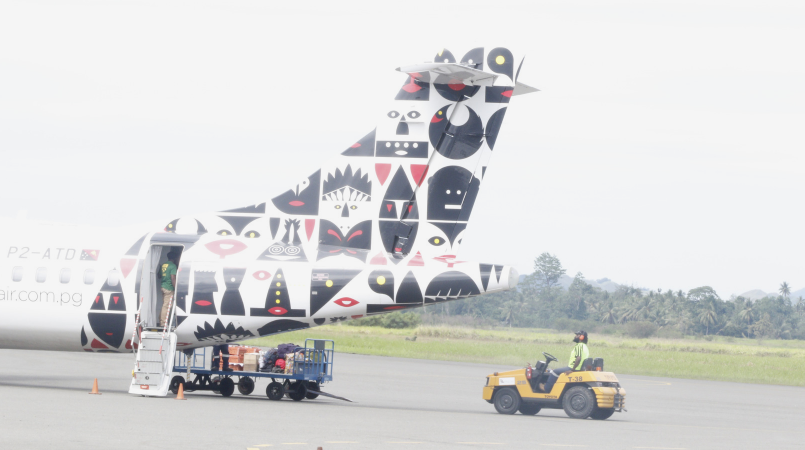
The Independent Consumer and Competition Commission has granted authorisation to PNG Air Limited (PNG Air) to give effect to a code-share agreement it is entering into with Virgin Australia for services between Port Moresby, PNG and Brisbane, Australia.
After comments received from stakeholders and submissions from the parties, the ICCC assessed the application and is satisfied that the code-share services, if authorised, would generate more benefits to the public, which are likely to outweigh any detriments, including any lessening of competition.
Commissioner and Chief Executive Officer Paulus Ain, whilst acknowledging that free sale code-share arrangement is not very competitive, said the arrangement will allow a new marketing carrier to enter the market.
“The ICCC considers that in the present circumstances, it is better to have PNG Air commence its international operations on the Port Moresby/Brisbane route on a free sale arrangement.”
Commissioner Ain added that consistent with its draft determination which was released on 1st February 2019, the ICCC considered that the following potential public benefits are likely to result if the parties provide the code-share services (despite likely anti-competitive outcomes):
- Travellers’ choice (of marketing carriers) would be increased (from three – currently Qantas, Air Niugini and Virgin Australia – to four);
- Travellers would have access to cheaper and more frequent passenger air services between PNG and Australia;
- Passengers would benefit from direct connections and ease of luggage transfers for connections to and from PNG Air’s domestic services;
- Further development of the route and making Port Moresby as a transit hub as passengers from other Pacific nations such as Federated States of Micronesia travel to Australian ports via Port Moresby; and vice versa; thus, increasing traffic volume through Port Moresby making possible for more frequent services, reducing passenger flight times to Australian destinations, and leading to cheaper fares in the long run as a result of increased passenger volumes;
- As the competitive pressure builds up and more public benefits are realised, it would lead to increase in traffic volume; hence, the possibility of other airlines entering the market by code-sharing or independently after airline companies provide aggressive competition on this route; and provision of direct services on a high frequency basis;
- Indirectly, the code-share arrangement has the potential of increasing competitive pressure between Air Niugini and PNG Air in the domestic market and will lead to benefits such as reduced airfares and better services for domestic consumers; and
- The above could increase traffic volume through Port Moresby, and make it possible for more frequent services, reduce passenger flight times to Asian destinations. Such outcome would also lead to cheaper and special fares in the long run.
On the other hand, the ICCC also noted that the following detriments are likely to occur:
- The ‘free sale’ arrangement is not likely to stimulate sufficient competition between PNG Air and Virgin Australia; and
- The code-share agreement would diminish the chances of independent entry by PNG Air.
Commissioner Ain said the ICCC has also noted some market conditions that may contribute to hinder potential new entry.
“The ICCC has noted that availability of limited slots at the Port Moresby Jackson’s International Airport could potentially inhibit new entries. The ICCC considers that despite the recent redevelopment at the Jackson’s Airport, there was no evidence which suggested that slot availability has increased.
“Should the demand grow for passenger (and freight) services for international flights, new carriers may enter the market and provide air transport services.”
The limited availability of slots and how the slots are allocated could hinder the entrance of potential airlines. This would likely lead to delayed/missed opportunity to enhance competition on the incumbents; hence the likely benefits. This is the matter for the National Airports Corporation to assess and take appropriate steps, if deemed necessary to improve.
The ICCC also noted that regulatory requirements such as airline designation and capacity requirements as per bilateral agreements between PNG and Australia can prove at times, to be challenging for a new carrier to enter.
It is understood that before an airline can operate international services to another country, the government must first negotiate a treaty level agreement with the destination country’s government. PNG has a bilateral Air Service Agreement (ASA) with Australia. Under the ASA, requirements such as traffic rights, capacity, designation, ownership and control, other policy, safety and security clauses would be included. Such regulatory requirements can make entry of a carrier into the international air transport services challenging; hence hinder potential effective competition. The State and the Department of Transport can consider this in the next bilateral ASA discussions with Australia.
The ICCC has considered the likely detriments in light of the current market conditions discussed above and the passenger volume growth being stagnant. Also, the ICCC notes that Air Niugini and Qantas have been taking up much of the volume.
Overall, the ICCC has considered that, whilst free sale may not stimulate much competition between PNG Air and Virgin, the arrangement would put some competitive pressure on the ‘bigger’ carriers. This would result in overall fare competition and benefits the traveling public.
Regarding the independent entry, the ICCC has considered that this code-share arrangement will assist PNG Air to ‘test the waters’ and eventually make a decision on whether or not to enter independently in future.
